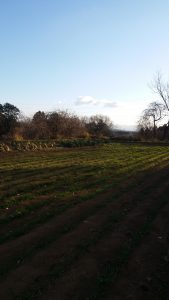 It has already been two weeks since we started our program. In recent days we spent most of time at ARI where we learnt about the natural agriculture contributed to the foodlife works of there. We did chores in the morning and afternoon, receive lectures from Yukiko and different organic farmers from Japan, and form a harmonious community with the staff members and volunteers from all over the world. We also learnt about organic farming in Japan, the history of ancient canels, and the recovery process of nuclear accident at Fukushima.
It has already been two weeks since we started our program. In recent days we spent most of time at ARI where we learnt about the natural agriculture contributed to the foodlife works of there. We did chores in the morning and afternoon, receive lectures from Yukiko and different organic farmers from Japan, and form a harmonious community with the staff members and volunteers from all over the world. We also learnt about organic farming in Japan, the history of ancient canels, and the recovery process of nuclear accident at Fukushima.
We’ve learnt from Miller’s article that through the horrible disease Minamata and the overfishing issue in Taiji, Japanese have learnt the problems of exploiting the enviornment around them. However, instead of respecting nature in a pure form, Japan regards technology as the remedy of all of environmental issues and relies on technology to form a better world. That is reflected by the scenes we’ve seen in Tokyo. Even though the only things I could see in Tokyo are man-made archetectures, there is very limited amount of pollution there. The incineration center and the technology development exhibition gave me the answer about the point. Tokyo actually seems to be like the perfect world shown in the disney movie Tomorrowland, the perfect environtechnical regime goverened by technology rather than nature. However, after the terrible Fukushima accident, the harms of overusing technology have already raised the attention of Japanese citizens. In recent days, Japanese rural communities have already taken actions to reterive nature back rather than the perfect environtechnical regimes in Japanese urban areas. ARI is actually an example of Japanese challgening the technological kingdom. All agricultural methods in ARI seem to be at least not trying to be destructing nature for the sake of us. ARI staff make fertilizers which are composed by dead plants and rice paddy, add necessary elements such as calsium and potassium made by natural elements rather than chemical elements, and make pesticides composed from rice paddy. Through our observations and volunteer works, we were very fortunate to have close understanding about how ARI’s mode of dealing with nature.
Actually I will not say ARI is ran by the mode of perfect wilderness, which I experienced in indigenous African habitats that humans were taking very humble, primitive roles. In the mode of perfect wilderness, however, humans have similar position with other animals that their fate are decided by nature. The story of the canel around ARI shows, based on the preresiquite of not challenging the governing position of nature, humans could shape better nature in proper ways to reduce, or even eliminate the negative effect caused by the wilderness of nature.
Recent Comments